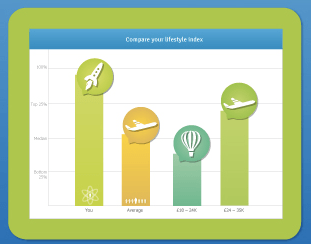The arena of social data comparison has become a hot space over the last, say, three years. With the rise of Facebook and Twitter we have concurrently seen the rise of platforms like Klout and PeerIndex, startups which have pushed the envelope on rating both the content of individuals’ expertise and their influence across a wider social circle. If you want a historical perspective, we no longer judge people by the color of their skin but by the content of their character (with apologies to MLK). But I will leave it to you to decided whether this brave new world is the fulfillment of his wishes. Suffice it to say, companies like Research Now, TNS, AC Neilson, Experian and IPSOS Mori are now, as we speak, furiously building out their own platforms to deal with this universe.
But now a new player has appeared, an Anglo-Russian startup called VisibleNation which claims to have launched the first free social data comparison platform after nine months in development.
It’s secured seed investment of $500,000 from undisclosed investors to create a site where users can compare their lives with others in nine different sectors such as career, health, finances, leisure, transport, family and education. After this users can – wait for it – compare their happiness, success and get a lifestyle rating.
Nikolai Puntikov, CEO VisibleNation, says sharing photos and comments online has become the norm but status updates don’t tell the whole story. He says sharing “useful” information creates much better data.
And he has a point. People tend to be overly upbeat on social networks. If they were encouraged to anonymously rate their lives in return for a comparison with others, they may have a far more realistic world view, which in turn creates far more value and verifiable data for the platform on which this data is held.
Currently VisibleNation is a 100% privately shared network and all personal details are kept private, hence why users feel that they might be getting value back from the idea.
Tantalisingly, that is the key. The question is, can users be engaged enough in the first place to try?
And here we are left with a conundrum and something which many feel that others have done better in the engagement stakes. Still, there’s everything to play for in this space.
